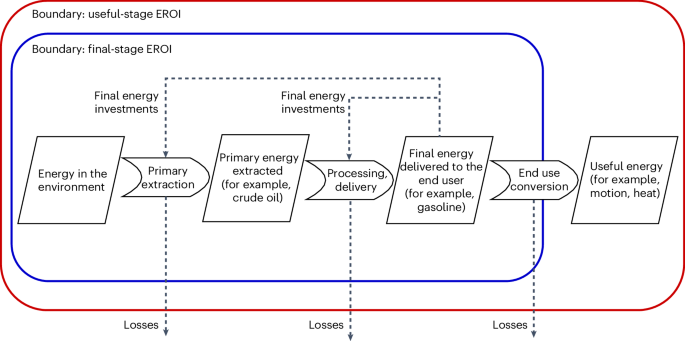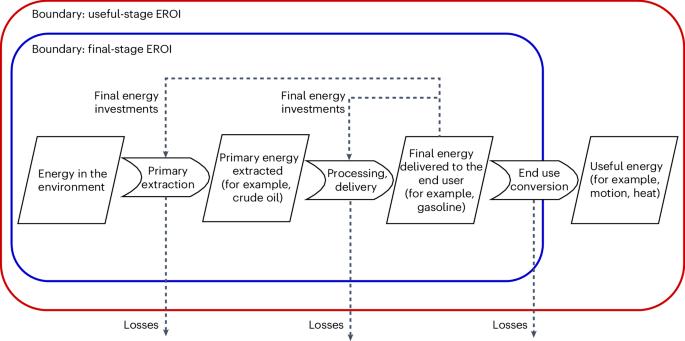化石燃料有用阶段能源投资回报估算及对可再生能源系统的影响
IF 49.7
1区 材料科学
Q1 ENERGY & FUELS
引用次数: 0
摘要
迄今为止,对能源转型的净能源影响的分析充其量只停留在最终能源阶段。在此,我们认为将分析扩展到有用阶段至关重要。我们估算了 1971-2020 年期间全球和各国化石燃料有用阶段的能源投资回报率(EROIs),并按最终用途对EROIs进行了分类。我们发现,化石燃料的有用阶段能源投资回报率(约为 3.5:1)大大低于最终阶段(约为 8.5:1),这是由于最终使用效率较低。此外,我们估计,产生电能的可再生能源与化石燃料可提供相同净有用能源的最终阶段 EROI(等效 EROI)约为 4.6:1。根据已公布的估算,即使考虑到一系列能源转型情景下间歇性的影响,发电可再生能源系统的 EROI 也高于确定的 EROI 当量。研究结果表明,能源转型可能不会导致净有用能源的减少,从而反驳了可再生能源系统无法在不造成巨大能源损失的情况下取代化石燃料的观点。本文章由计算机程序翻译,如有差异,请以英文原文为准。


Estimation of useful-stage energy returns on investment for fossil fuels and implications for renewable energy systems
The net energy implications of the energy transition have so far been analysed at best at the final energy stage. Here we argue that expanding the analysis to the useful stage is crucial. We estimate fossil fuelsʼ useful-stage energy returns on investment (EROIs) over the period 1971–2020, globally and nationally, and disaggregate EROIs by end use. We find that fossil fuelsʼ useful-stage EROIs (~3.5:1) are considerably lower than at the final stage (~8.5:1), due to low final-to-useful efficiencies. Further, we estimate the final-stage EROI for which electricity-yielding renewable energy would deliver the same net useful energy as fossil fuels (EROI equivalent) to be approximately 4.6:1. The EROIs of electricity-yielding renewable energy systems, based on published estimations, are found to be higher than the determined EROI equivalent, even considering the effects of intermittency under a range of energy transition scenarios. Results suggest that the energy transition may happen without a decline in net useful energy, countering the view that renewable energy systems cannot replace fossil fuels without incurring a substantial energy penalty. Net energy implications of the energy transition have primarily been assessed at the final energy stage to date. New research considers the useful-stage energy return on investment and finds that wind and solar photovoltaics outperform fossil fuels, shedding light on their investment potential.
求助全文
通过发布文献求助,成功后即可免费获取论文全文。
去求助
来源期刊

Nature Energy
Energy-Energy Engineering and Power Technology
CiteScore
75.10
自引率
1.10%
发文量
193
期刊介绍:
Nature Energy is a monthly, online-only journal committed to showcasing the most impactful research on energy, covering everything from its generation and distribution to the societal implications of energy technologies and policies.
With a focus on exploring all facets of the ongoing energy discourse, Nature Energy delves into topics such as energy generation, storage, distribution, management, and the societal impacts of energy technologies and policies. Emphasizing studies that push the boundaries of knowledge and contribute to the development of next-generation solutions, the journal serves as a platform for the exchange of ideas among stakeholders at the forefront of the energy sector.
Maintaining the hallmark standards of the Nature brand, Nature Energy boasts a dedicated team of professional editors, a rigorous peer-review process, meticulous copy-editing and production, rapid publication times, and editorial independence.
In addition to original research articles, Nature Energy also publishes a range of content types, including Comments, Perspectives, Reviews, News & Views, Features, and Correspondence, covering a diverse array of disciplines relevant to the field of energy.
 求助内容:
求助内容: 应助结果提醒方式:
应助结果提醒方式:


